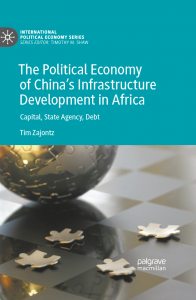New monograph in Palgrave’s International Political Economy series

Book description
This book sheds light on structural drivers that led to the Chinese omnipresence in African infrastructure markets and offers a strategic-relational approach to the study of African agency in Sino-African infrastructure encounters. Case studies cover the Tanzania-Zambia Railway Authority (TAZARA), Zambia’s road sector as well as Tanzania’s Bagamoyo port and Standard Gauge Railway. It is shown that African (state) agency in the infrastructure sector is contingent upon dynamic state-society relations and distinct political-economic contexts and constraints. The book problematises contradictions related to infrastructure debt, the emergence of Sino-African public-private partnerships and the intensifying geopolitics-cum-geoeconomics of infrastructure across Africa.
The book…
- Combines theorisation of Sino-African infrastructure cooperation with in-depth case studies from Tanzania and Zambia
- Develops an original structurally grounded approach to the study of African agency in Sino-African relations
- Adds nuance to the highly politicised debates about Chinese-owned African debt in times of intensifying geopolitics
Critics’ reviews
“Theoretically informed and enriched by fieldwork, this new book sheds light on the sometimes-murky depths of Chinese infrastructure engagement in Africa. Using Tanzania and Zambia to ground the research, Tim Zajontz highlights the African state strategies that shaped disparate outcomes. This perceptive analysis has global implications. It will be a useful resource for scholars and policymakers trying to understand the expansion of Chinese capital across Africa, and beyond.”
Deborah Brautigam, Bernard L. Schwartz Professor of International Political Economy Emerita, School of Advanced International Studies, Johns Hopkins University
“This book is a welcome addition to the China-Africa field. Empirically detailed and rich, its real strength lies in its theoretical sophistication and valuable engagement with the notion of Africa’s agency in relations with China. A compelling analysis of China’s evolving role in Africa’s infrastructure economy, the book is sure to be a landmark text in the field.”
Scarlett Cornelissen, Professor in Political Science, Stellenbosch University, South Africa
“This is one of the first studies to develop an innovative, synthetic and overarching theoretical framework to understand the Belt and Road Initiative’s operation. It demonstrates its applicability through detailed, definitive and defining empirical research. This is vital reading to understand China’s current and ongoing impacts in Africa.”
Pádraig Carmody, Professor in Geography, Trinity College Dublin
“The book offers valuable, theory-informed insights into Africa’s Chinese-funded infrastructure boom of the 2010s and the politics it has engendered. The author gained remarkable insights into Tanzanian and Zambian policy-making in the infrastructure sector. The book goes far beyond the many macro-analytical studies of China’s Belt and Road Initiative in Africa and unearths how Chinese infrastructure projects are shaped by political and economic processes within African states, something which is often overlooked by analysts. I highly recommend it to anyone who is interested in the past, present and future of China’s relations with Tanzania and Zambia.”
Muhidin Shangwe, Lecturer, Department of Political Science and Public Administration, University of Dar es Salaam
“This important book provides a welcome corrective to reductive analyses of Chinese debt-financed infrastructure in Africa. Using both critical theory and concrete examples, Tim Zajontz shows how the globalization of Chinese capital and Africa’s dire need for infrastructure came together to fashion the ‘infrastructure state.'”
Jamie Monson, Professor in History, Michigan State University
“There is no other book in the China-Africa academic realm that tackles the nexus of infrastructure and debt as painstakingly and critically as this one. Tim Zajontz unpacks China’s spectacular growth as a builder and financier of African infrastructure, a material incarnation of which is China’s Belt and Road Initiative. However, instead of portraying African countries as submissive term-takers and reactive loan borrowers, as is usually narrated, he places African agency at the very center of the book’s storyline. China’s inroads into the region are not presented conventionally either. Zajontz highlights the structural overaccumulation in the Chinese economy as the prime driver of Sino-African infrastructure encounters. Grounded in theory and reinforced by informative case studies, this book offers a refreshing read and seeks to expand our understanding of the complexity of China-Africa relations.”
Dominik Kopiński, Professor in Economics, University of Wrocław
